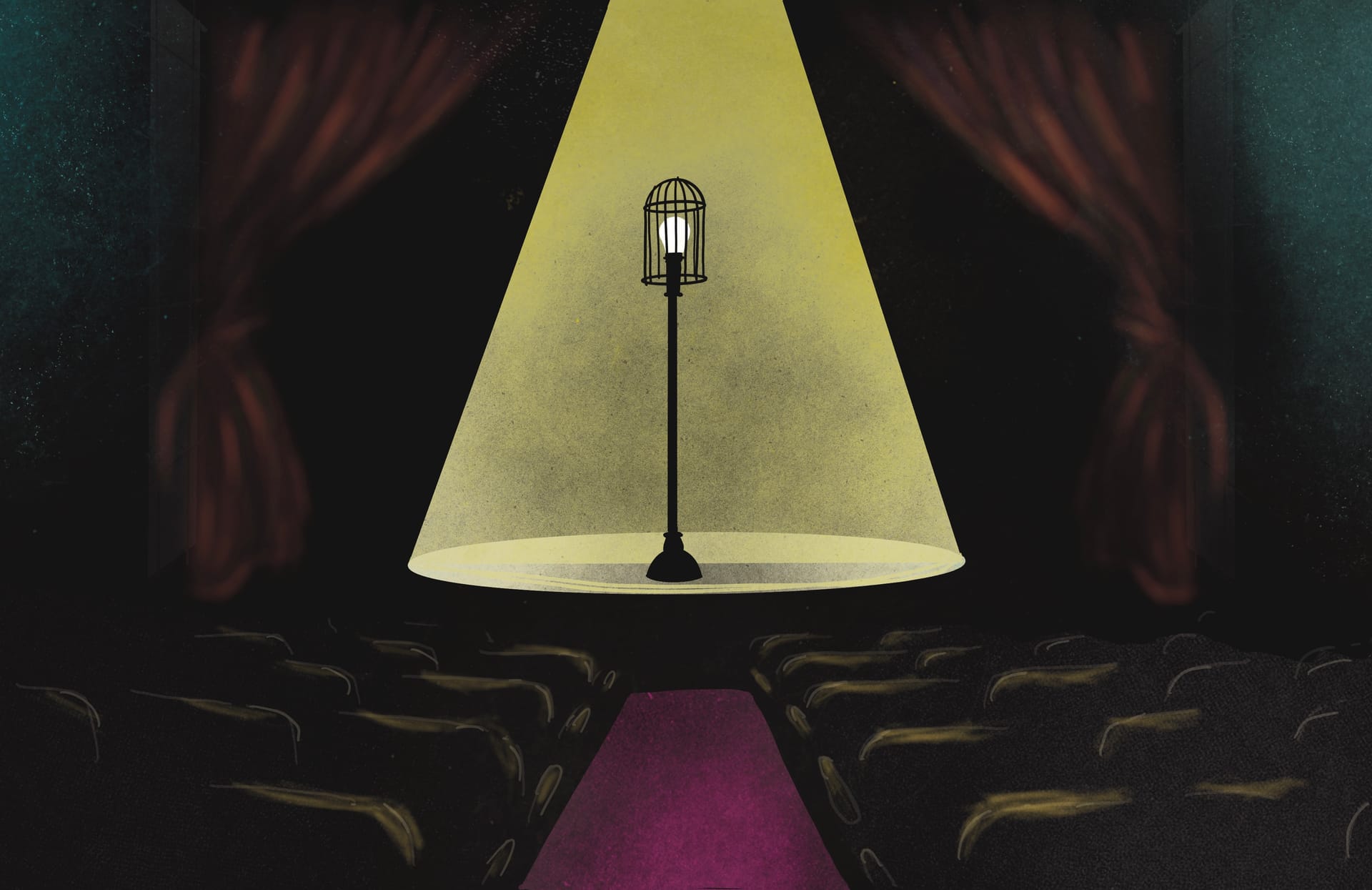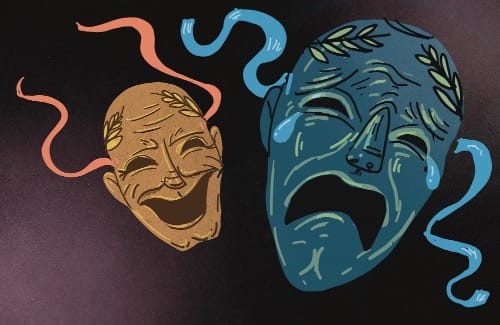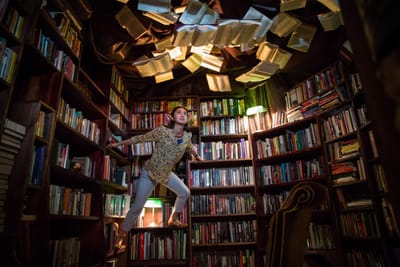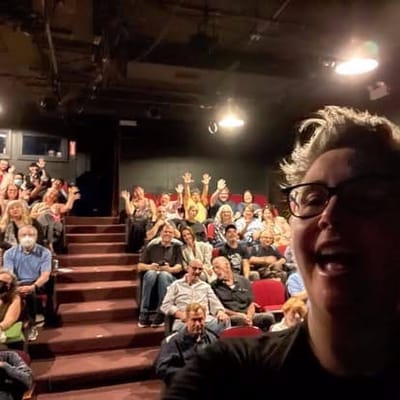NEA Cuts Threaten to Drop the Curtain on Arts Funding

Meet Jenny Magnus, Chicago Curious Branch Theatre Company co-founder and Albany Park resident. She is just one of thousands of arts organization leaders reeling from the news that the Trump administration is eviscerating arts funding.
“The arts community doesn’t know where the money is going to come from. That’s the despair,” Jenny says, but she’s quick to add: “There’s also determination that we will not let these people put us down. We will continue to make art no matter what. If it depends on rigor, energy and will, we will keep going no matter what.”

When Jenny moved to Chicago in the 1980s, the only person she knew was Beau O’Reilly, whom she had met just once. He cast her in a show. And, the rest, as they say, was history. Jenny and Beau collaborated on writing music and were both in the band Maestro Subgum and the Whole. She yearned to pursue theatrical performance, so the pair created the Curious Theatre Branch in 1988.
Now in its 36th season, the tenacious, nomadic theater company headquartered in Albany Park has weathered its share of storms. “We believe in radical hospitality, making theater accessible to everyone. Our suggested ticket price is $20, but audience members always pay whatever they can, often nothing at all,” she says.
Curious Branch’s founding principles have steadied the theater group through times of instability. “Our ethos from Day One has been to go deeper, not to expand. We’ve stayed nimble and low to the ground. We don’t have our own theater space. Our productions are lean. We never feel comfortable,” Jenny laughs, “but our commitment to staying small has helped us stay afloat through the pandemic and frenetic funding shifts, including losing significant, long-term grants.”
What is happening now might be something more dire. The Trump administration has made drastic cuts to arts funding that supports theaters like Curious Branch and communication has been contradictory and confusing.
There has also been some great news. The Illinois General Assembly passed a state budget that maintains some funding for the arts in FY26, and the City of Chicago just announced an arts relief fund to help mitigate the damage (with a deadline of August 20 to apply). Yet the future health and vitality of Chicago arts are unclear. Local museums, visual arts, theaters, music venues, community educational programs and more are scrambling for answers and funding alternatives.
NEA: Money and More
Early in May, the feds cut funding to the National Endowment for the Arts (NEA) as well as the National Endowment for the Humanities (NEH) and Institute of Museum and Library Services (IMLS), impacting nearly 560 organizations around the country. Several Chicago-area groups, including Open House Chicago and the Black Harvest Film Festival, lost 2025 funding.
But, let’s back up. What exactly is the NEA, and why is it important? Established in 1965, the independent federal agency is best known for its grantmaking, but it also leads and facilitates conversations about issues important to the arts community and where art intersects with other fields such as healthcare, education and community development. In addition to funding arts organizations, the NEA enables groups around the country to reach marginalized, underserved and rural communities.
It's not just that the administration doesn't appreciate live theater or ballet; they also don't care if children in underfunded schools can learn music or how to paint. And, they are completely oblivious to the arts' role in our economy: This sector adds $1.2 trillion annually and supports 5.2 million jobs.
Some 40% of the NEA’s budget goes to state arts agencies like our Illinois Arts Council, which steers funds throughout the state. Of approximately $36.8 million in NEA grants, nearly $2 million was awarded in Illinois in 2025. The vast majority of that — 95% — was awarded in Cook County.

The country’s arts and culture organizations haven’t even felt the worst of it yet. The president’s FY26 budget aims to eliminate all NEA, NEH and IMLS funding.
- $207M in federal funds for the National Endowment for the Arts, which translates to approximately $6M annually to Illinois.
- $207M in federal funds for the National Endowment for the Humanities, which means some $4M in cuts annually to Illinois.
- $295M in federal funds for the Institute of Museum & Library Services, which will mean a $10.8M annual loss in funding to Illinois.
Every organization that receives money from these agencies would need to quickly replace it to stay afloat.
Safe … For Now
On Chicago’s Northwest Side, residents can experience an incredibly rich array of live theater experiences. More than 20 local companies perform shows that let us experience real stories of immigrants and refugees living in Albany Park, enjoy the timeless tale of Chicken Little, watch LGBTQ history unfold and so much more.
“Live theater is crucial. It’s the embodiment of a story, and story is how we understand the world,” Jenny says. “Also being together in a room to experience something cannot be underestimated. Studies show our heartbeats can actually start to synchronize!”
Because Curious Branch doesn’t currently receive NEA grants, it has dodged a bullet for now. Kind of.
“Even though the NEA cuts don’t affect us directly, the theater world is deeply interconnected,” Jenny explains. “What affects one of us, eventually affects us all. We fully expect to feel the ripple effects.”
For example, Curious Branch rents theater space to perform. “It’s our single largest expense. The pandemic forced many theaters to close, and those that remain available for rental are more expensive than ever. When cuts close even more theaters and arts organizations, spaces will become even more rare and cost-prohibitive,” Jenny says.
In spite of lean and unpredictable times, and maybe because of them, Curious Branch still plans to host its 36th Rhinofest this September. This storefront theater festival draws thousands each year. It is part arts mutual aid, part community building and provides production and exhibition opportunities to hundreds of artists.
Festival performances will take place September 1-29, 2025 at three Chicago venues: Jarvis Square Theater (Rogers Park), Labyrinth Arts Club (Old Irving/Mayfair) and Facility (Humboldt Park). Learn more
What else can Northwest Side neighbors do to help? According to Jenny, “Make it a priority to check out small, local theater groups—particularly those featuring new work—these always need the most support. Theater is great for date night, girls’ night out, bring your book group!”
If this story spoke to you, please share with a friend and check out ways to help!
- Contact your elected official about protecting arts and culture from the federal 2026 budget. https://artsalliance.quorum.us/
- Advocate with the League of Chicago Theatres. https://leagueofchicagotheatres.org.
- Sign up for alerts to stay on top of arts-related funding news. https://artsalliance.quorum.us/
- Learn about what's happening with federal funding issues. https://artsalliance.org/advocacy/federal.
- Raise your voice. Use social media, community forums and conversations with friends and neighbors to share why the arts matter to you. A great resource is Arts Alliance Illinois’ social media outreach toolkit.
- Support local theaters directly. Donate, subscribe, buy tickets. Even a small contribution makes a difference!
3rd Dimension Performance Group
Curious Theatre Branch, including its upcoming Rhinofest
Read about how two friends are doing their part to support local theater.
Check back soon for more resources and ways to support the arts.
Subscribe to our newsletter.
Be the first to know - subscribe today




